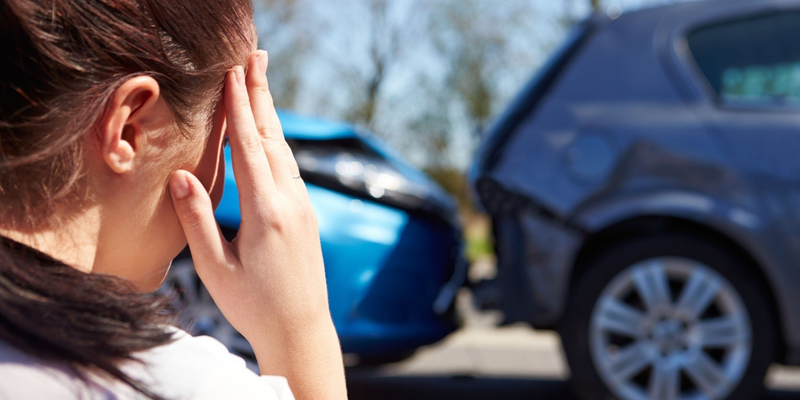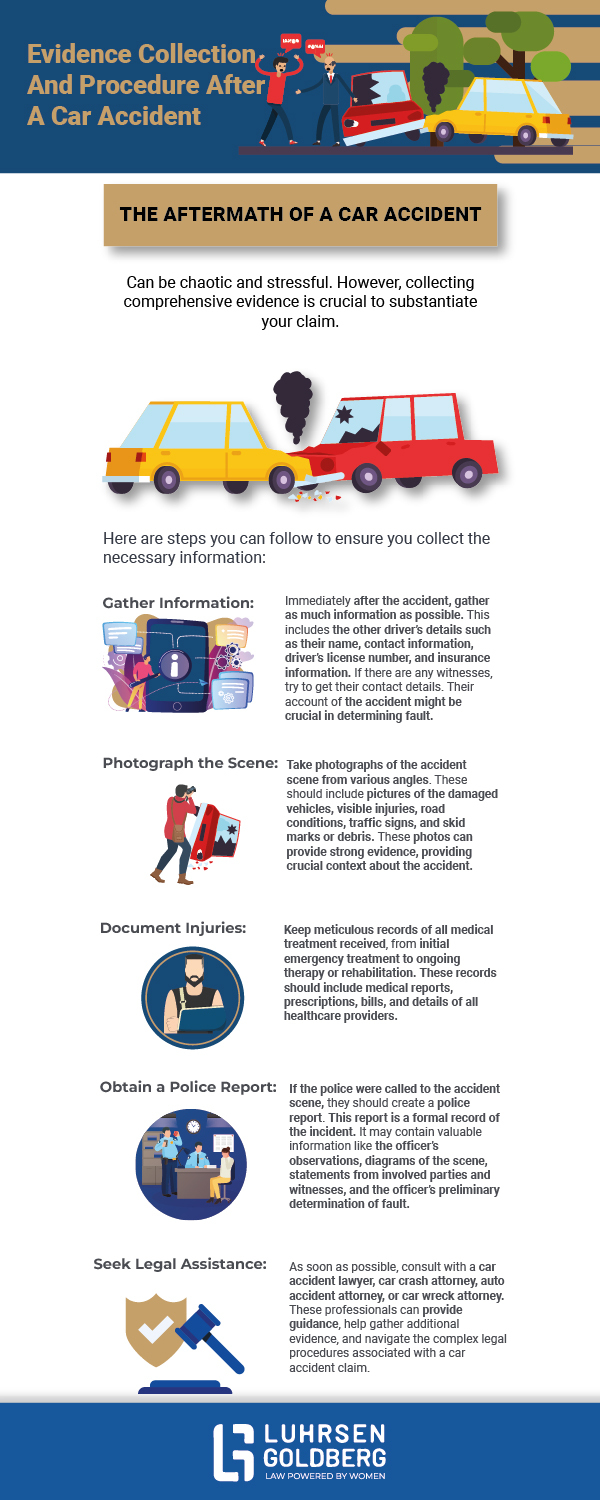Car Accidents
Sarasota, Bradenton and Lakewood Ranch
florida car accident lawyers

Car & Auto Accidents
Florida’s sunny skies, sandy beaches, and breathtaking landscapes make it a popular destination for tourists and individuals seeking a peaceful retirement. However, with the increased traffic and number of drivers, the state sees many car accidents yearly, illustrating the need for a car crash attorney. Enlisting the services of a Florida car accident lawyer from Luhrsen Goldberg is an essential first step to securing justice.
A Detailed Look at Common Causes of Florida Car Accidents
Florida’s unique demographic composition, changing weather conditions, and diverse traffic situations result in a range of car accidents attributable to various causes. Each of these factors, individually or in combination, can contribute to a hazardous environment on the road. Understanding these causes can help drivers mitigate risks and navigate Florida roads more safely.
Distracted Driving
Distractions while driving are one of the leading causes of accidents in Florida and nationwide. Distractions can include anything that diverts a driver’s attention from the road. Texting or talking on the phone, eating, changing radio stations, inputting directions into a GPS, waze or other mapping service, or even interacting with other passengers can lead to distracted driving. The prevalence of smartphones has amplified this problem, allowing for many potential distractions at drivers’ fingertips. Distracted drivers are less aware of their surroundings and have slower reaction times, which can result in severe accidents.
Impaired Driving
Impaired driving, whether due to alcohol or drug consumption, is a critical issue in traffic safety. Substances such as alcohol and drugs can severely impair a driver’s ability to function behind the wheel, affecting their motor skills, decreasing reaction times, and impairing judgment. Despite rigorous campaigns against drunk driving and strict legal consequences, impaired driving remains a persistent issue on Florida roads.
Reckless Driving
Reckless or aggressive driving encompasses a variety of traffic offenses. It involves actions that demonstrate a disregard for safety and traffic regulations such as tailgating, changing lanes without signaling, not yielding to drivers with the right-of-way, and excessive speeding. These aggressive behaviors can escalate road situations, leading to dangerous accidents.
Speeding
Exceeding the speed limit is a common cause of accidents in Florida. Higher speeds reduce a driver’s ability to steer safely around curves or objects in the roadway, extend the distance necessary to stop a vehicle, and increase the distance a vehicle travels. In essence, speeding leaves less time for evasive action and results in more severe accidents when they occur.
Poor Weather Conditions
Florida’s weather can be unpredictable. Poor weather conditions like heavy rain, occasional fog, and hurricanes often lead to dangerous driving conditions. Wet or slippery roads, flooded roadways, reduced visibility, and high winds can all make controlling a vehicle more challenging and contribute to accidents. Drivers inexperienced in these conditions are particularly vulnerable.
Unexpected Events
Events that drivers have little control over such as tire blowouts, sudden health emergencies, or mechanical failures, can lead to unexpected accidents. For example, a tire blowout at high speed can cause a driver to lose control of their vehicle. At the same time, a sudden health emergency like a heart attack or stroke can lead to the driver becoming incapacitated.
Failure to Obey Traffic Laws
Disregarding traffic laws significantly contributes to the number of car accidents in Florida. Ignoring traffic signals, not yielding the right of way, making illegal turns, or any other violation of traffic laws can result in dangerous situations which can lead to accidents. By understanding and acknowledging these common causes of accidents, drivers can remain vigilant on the roads, exercise better judgment, and hopefully contribute to safer driving conditions for all Florida motorists.
Injury Severity in Car Accidents: From Minor to Critical
Car accidents can result in various injuries, each with its unique complications and recovery timeline. Understanding these can help you comprehend the potential physical impact of a car accident.
Minor Injuries
Minor injuries typically include scrapes, bruises, minor burns, and sprains. These injuries might seem insignificant at first glance, but they can still cause discomfort and inconvenience, potentially interfering with daily activities. Even if injuries appear minor, it is critical to seek immediate medical attention. This is because certain conditions such as internal bleeding or concussions, can initially present minor symptoms but could escalate if left untreated. Florida’s no-fault laws require that you seek medical care within 14 days of a motor vehicle crash in order to preserve access to PIP (aka No-Fault) insurance which helps pay for medical bills.
Mild Injuries
These include more severe cuts, bruises, fractures, dislocations, and mild concussions. Mild injuries usually require more extensive medical intervention such as surgery or physical therapy, and a longer recovery period. For example, a fractured bone might need to be set and cast, which could take several weeks or months to heal completely. These injuries can potentially lead to temporary disability and may require significant lifestyle adjustments during the recovery period.
Severe Injuries
These can be life-altering and include traumatic brain injuries, spinal cord injuries, severe burns, multiple bone fractures, and amputations. Severe injuries often necessitate immediate and prolonged hospital stays, extensive medical treatment, rehabilitation, and long-term care. These injuries can also lead to permanent disability, drastically affecting the victim’s quality of life. The physical, emotional, and financial burden of injuries can be significant, often lasting a lifetime.
Understanding Economic vs. Non-Economic Damages
After a car accident, the victim can seek compensation for various damages. These damages are generally classified into two categories: economic and non-economic damages.
Economic Damages
These damages correspond to direct, quantifiable financial losses resulting from the accident. They include past and future medical expenses such as hospital bills, costs for surgery, rehabilitation, physical therapy, medication, and any necessary medical equipment. Additionally, they cover lost wages if the victim had to take time off work to recover or the loss of earning capacity if the accident permanently impacts the victim’s ability to work. They also encompass property damage, which includes repair or replacement costs for any vehicles or other personal property damaged in the accident.
Non-Economic Damages
These damages are intangible and, therefore, more challenging to quantify. They compensate the victim for the physical pain and suffering from the accident and emotional distress, which could manifest as anxiety, depression, post-traumatic stress disorder (PTSD), and other psychological conditions. Non-economic damages also account for the loss of enjoyment of life, which refers to the decreased quality of life due to physical limitations, mental anguish, or loss of recreational activities. In severe cases, these damages can include compensation for the loss of companionship or consortium due to a loved one’s death or permanent incapacitation.
Dispelling Common Myths About Florida Car Accidents
There’s a lot of misinformation surrounding car accidents in Florida. This can often lead to confusion, potentially impacting a victim’s decision-making process and claim.
Myth 1: The Driver Who Gets a Ticket is Always at Fault
Many people assume that if a driver gets a ticket at the scene of an accident, they are automatically at fault. However, this isn’t always the case. While a traffic ticket can indicate a violation of traffic laws, it does not definitively establish fault for an accident. Determining liability in a car accident involves an examination of all the available evidence and a detailed analysis of the circumstances surrounding the accident.
Myth 2: Settling With Insurance Companies Quickly is Beneficial
It’s a common misconception that it’s in a victim’s best interest to settle with an insurance company immediately after an accident. However, rushing into a settlement can result in significantly lower compensation. This is because it can take some time to fully realize the extent of the injuries, the total medical costs, and the overall impact on the victim’s life.
Myth 3: Legal Representation is Too Expensive
Many victims avoid seeking legal help because they believe they can’t afford a car accident lawyer. However, most car accident attorneys work on a contingency fee basis. This means they only get paid if they win your case or successfully negotiate a settlement, making their services affordable.
Evidence Collection and Procedure After a Car Accident
The aftermath of a car accident can be chaotic and stressful. However, collecting comprehensive evidence is crucial to substantiate your claim. Here are steps you can follow to ensure you collect the necessary information:
- Gather Information: Immediately after the accident, gather as much information as possible. This includes the other driver’s details such as their name, contact information, driver’s license number, and insurance information. If there are any witnesses, try to get their contact details. Their account of the accident might be crucial in determining fault.
- Photograph the Scene: Take photographs of the accident scene from various angles. These should include pictures of the damaged vehicles, visible injuries, road conditions, traffic signs, and skid marks or debris. These photos can provide strong evidence, providing crucial context about the accident.
- Document Injuries and Treatment: Keep meticulous records of all medical treatment received, from initial emergency treatment to ongoing therapy or rehabilitation. These records should include medical reports, prescriptions, bills, and details of all healthcare providers. Maintaining a diary documenting how your injuries have affected your day-to-day life is also beneficial.
- Obtain a Police Report: If the police were called to the accident scene, they should create a police report. This report is a formal record of the incident. It may contain valuable information like the officer’s observations, diagrams of the scene, statements from involved parties and witnesses, and the officer’s preliminary determination of fault (if available).
- Seek Legal Assistance: As soon as possible, consult with a car accident lawyer, car crash attorney, auto accident attorney, or car wreck attorney. These professionals can provide guidance, help gather additional evidence, and navigate the complex legal procedures associated with a car accident claim.

Understanding the Statute of Limitations in Florida Car Accidents
The statute of limitations is a critical legal term that refers to the timeframe for legal proceedings following a car accident. It sets a strict deadline for filing a lawsuit in court. If a claim is not filed within this time limit, the right to pursue compensation for damages may be lost permanently.
In 2023, Florida shortened the statute of limitations on most negligence claims to two years from the accident date. There are, however, times when other statutes of limitations as well as notice and other deadlines may apply and be shorter. If the statute of limitation is exceeded then the injury claim will be barred making time of the essence to either settle the claim or at least initiate a lawsuit.
Personal Injury Claims
If the car accident resulted in bodily injuries, you must file a personal injury lawsuit two years from the accident date. This two year limit applies to any claim for damages related to personal injury, including pain and suffering, lost wages, and medical expenses.
Wrongful Death Claims
If the car accident resulted in a death, the victim’s family or estate has two years from the date of the person’s death to file a wrongful death lawsuit. Note that this is different from the date of the accident; if the victim initially survived the accident but died from their injuries weeks or months later, the two-year countdown starts from the date of death, not the date of the accident.
Consequences if the Statute of Limitation is Not Met
Understanding the statute of limitations for your car accident case is crucial. Missing the deadline could mean losing your right to compensation for your injuries. Therefore, consulting with a car accident lawyer soon after an accident is highly recommended to protect your rights and ensure compliance with all legal time limits.
The Critical Role of Legal Representation in Car Accident Cases
Experiencing a car accident can be traumatic, leading to physical injuries, emotional distress, and significant financial hardships. The immediate focus after an accident is naturally on medical treatment and recovery. Still, various legal and insurance issues need to be dealt with simultaneously. This is where the assistance of legal professionals such as car accident lawyers becomes invaluable.
In-Depth Legal Experience
Car accident attorneys focus on personal injury law and are well-versed in the nuances of Florida’s complex auto accident laws. They can provide insightful guidance through the intricate legal processes and ensure you understand your rights and potential avenues for compensation. They stay updated on any changes in legislation and court rulings that may affect your case and use this knowledge to develop a legal strategy.
Thorough Evidence Gathering
While you focus on healing and recovery, your attorney is responsible for collecting compelling evidence to substantiate your claim. They understand what evidence can significantly strengthen your case and how to obtain them. This evidence may include medical reports, witness statements, police reports, accident scene photographs, and expert testimonies. They may also reconstruct the accident scene or bring medical experts to testify about your injuries, adding significant weight to your claim.
Adept Negotiations With Insurance Companies
Insurance companies are businesses, and like any business, their goal is to minimize costs — including the payout for your claim. They often employ tactics that aim to devalue your claim or even deny it outright. A seasoned attorney knows how to counter these tactics effectively. They can negotiate assertively with these companies, using the collected evidence to substantiate your claim and ensure you receive the full compensation you are entitled to.
Accurate Determination of Claim Value
Determining the total value of a claim from a car accident can be a complex process. It’s not just about current medical bills and car repair costs. A comprehensive claim should account for future medical treatment, ongoing physical therapy, lost earning capacity, and non-economic damages like pain and suffering, and emotional distress. A knowledgeable attorney can accurately assess the total value of your claim, account for the unique facts and circumstances of the claim and then advocate for a resolution that best reflects these factors.
Representation in Court
While many car accident claims are settled out of court, there are situations where a fair settlement cannot be reached and the case needs to be litigated. In such scenarios, your attorney can represent your interests in court. They will prepare and present a persuasive case, challenge the opposition’s arguments, and advocate zealously for your rights.
Contact Luhrsen Goldberg for a Florida Car Accident Lawyer
In addition to top-notch legal guidance, a Florida car accident lawyer from Luhrsen Goldberg provides moral support during an incredibly stressful time. They understand the physical, emotional, and financial stress that car accident victims go through and can provide the reassurance and guidance needed during such challenging times. Contact us today to learn how our Law Powered by Women® legal assistance can work for you.






